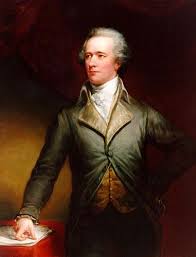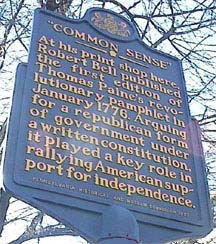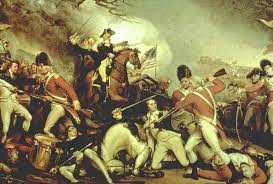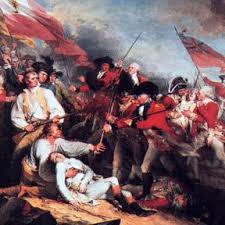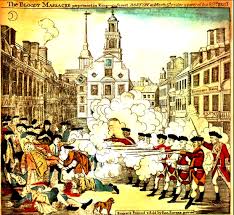
It's a good thing this isn't a political blog, because if it was I would have to yell YIPPIIEEE! to the Tea Party patriots who are making such a huge difference in America today. Giddiness and joy overcome my heart when I read headlines like, "Establishment Freaked!" However, it is very important to act as mature adults at all times and treat others with kindness and deference, as they have done to us. So if you are tempted to lose your cool, please... take a minute... breathe deep, and follow these directions: 1) Put your hands on your hips, 2) hinge from the waist, 3) cross your eyes, 4) stick your tongue out really far, 5) and yell (may want to bring tongue back in for this one...) "
Whaaa! Let's call the whaaaaaaambulance!" 
Yup, good thing this isn't a political blog... that would be childish. So - on with Chapter 3, "Colonies No More" from
A Patriot's History... Has your jaw hit the floor yet? Oh... it will, my friend, it will.

We're going to post a short study guide each week to fill in with your study of the book. Post any thoughts you have on this approach. Does it help? Does it hurt? Does it make you shudder as you recall high school days when the teacher called for your completed study guide? You frantically scramble through your papers as it flits to the floor just as crisp and white and blank as the day you got it?? Whoopsie... that never happened to me. Shame on you! BTW.... Don't know if you've noticed, and this may come as a shock... I'm not a computer genius. This doesn't line up and look all Power point-ish... so you'll have to deal with it. I make a mean Texas Sheet Cake. We all have our talents...
Colonies No More pg. 58-87 - Study Guide
1. Effects of French and Indian War: British? Colonists? French? Indians? British amassed huge debt and fully expected the colonists to pay their fair share. The colonists, on the other hand, felt that being British citizens, the crown was obligated to protect them and therefore, they shouldn't have to contribute. The colonists came out with the best results of all parties. French: Also lost land and amassed big debt. The Indians lost land through British betrayal.
2. What was the Proclamation of 1763? The Brits feared another uprising so they established a policy prohibiting westward expansion drawing a line through the Appalachians. This was a futile effort because whites continued to pour over the so-called boundary. Traders with existing charters, of course, did not want the competition from the new settlers; also futile.
3. Compare the views of property rights by the settlers and the Indians. The Colonists came to America fully expecting to gain land, voting rights, etc. But when they got here, the land was occupied by various Indian tribes. The Indians didn't believe that
anyone could actually own land anyway. They were betrayed by broken treaties from the government that some people... think we should still be paying for!!
http://www.youtube.com/watch?v=f6xELjQPsuw Incidently, the Indians took advantage of this situation... "trading" the land for supplies that they needed. They thought they had tricked the whites into giving something for nothing. Seems everyone was at fault here! Hmmmmm.
4. King George wrote, "It is with utmost astonishment that I find any of my subjects capable of encouraging the rebellious disposition... in some of my colonies in America." What "acts" did he then impose and to what end? Ok - he was pretty clueless, let's admit. He thought he could tax his way out of debt by nickel and diming the colonists. The Sugar Act,
http://www.ushistory.org/declaration/related/sugaract.htm
The Stamp Act
http://en.wikipedia.org/wiki/Stamp_Act_1765 ,The Townshend Acts,
http://en.wikipedia.org/wiki/Townshend_Acts , The Tea Act,
http://www.ushistory.org/declaration/related/teaact.htm ,the Intolerable Acts
http://www.historywiz.com/intolerable.htm . He basically levied a tax on every part of their lives. Can you even imagine an elitist like King George doing that today?? After 235 years? You can?? Hmmmm.
5. The Boston "Massacre" -British troops were sent as a sign of "defiant occupation" into Boston. Under Samuel Adams's lead, a group of colonists began to harrass the "terrified" soldiers until a street fight broke out and several colonists were "massacred". Was this indeed a massacre? Why or why not?
Sam Adams was a brilliant propagandist (is that a word?). What other word could be more graphic than "massacre"? He published several pamphlets and papers inciting the British in this horrid act. The truth is that the British soldiers, mere boys themselves, felt threatened as they were being harrassed by the colonists. A fight did indeed break out and 5 colonists were indeed shot, but it was mostly a tragic ending to heightened emotions on both sides. Adams used this as "fuel to the fire" fomenting the rage and inevitable rebellion. It worked. John Adams defended the soldiers and got them off this charge, for which he was harrassed by many of the colonists; including his own cousin, Sam.
6. How was the Boston "Massacre" a catalyst? It was really what began the American Revolution.
7. Besides the many pamphlets and newspapers fomenting rebellion, what groups emerged further uniting the colonies toward revolution? The Sons of Liberty,
http://en.wikipedia.org/wiki/Sons_of_Liberty Sons of Neptune, Philadelphia Patriotic Society, etc. All political groups supporting revolution against the tyranny of England.
8. How was Paul Revere's social status important to his future famous "ride"? Everyone knew him. He was a member of many of these political groups. He was instrumental in setting up communication lines at a moment's notice among the colonists.
9. The Boston Tea Party had tremendous significance to the American Revolution. Specifically what about that incident has carried over to today's "Tea Party"? Tea was crucial to early American life. The water was often tainted and undrinkable being full of disease or polution. So they drank tea almost exclusively. Because it was heavily taxed, and was shipped through England from the West Indies, the colonists wanted to make a real statment about
taxation without representation. What better way than to dump hundreds of chests of tea overboard while the "local authorities looked on and condoned." Today's Tea Party was born out of frustration with a government that seems to care only about pushing an agenda through and not listening to the people. January of 2011, most Americans will see skyrocketing taxes on almost every aspect of their lives. 61% - 78% of the population disagrees with these policies.
Taxation without representaion? Sure we have elected officials (and the colonists did not!) that are supposed to vote the way their constituents wish. We all know how that has turned out!
10. What philosophical roles did John Locke, Thomas Hobbs, and Baron Charles de Montesquieu play in the revolution? Locke: limited government, "life, liberty and the pursuit of happiness"; Locke and Hobbs: government was created by man to "protect" him and those inalienable rights. Montesquieu: checks and balance of powers in government.
11. What role did the signers' Christian ideology play in signing the Declaration of Independence? Half the signers had seminary training and all had a devout belief in God and man's dependency on Him. Every household studied and was taught to read from the bible. God was the center of their lives and so played a critical role in this holy document.
12. How did the "Minutemen" differ from the British military? Why were they called "Minutemen"? This was a bunch of farmers, planters, merchants and dads. The colonists specifically did not want a standing army like the British had. They were not well-trained, uniformed, paid or schooled as the British army. But they knew that they could be called on on a "minute's" notice to fight and defend against the British empire.
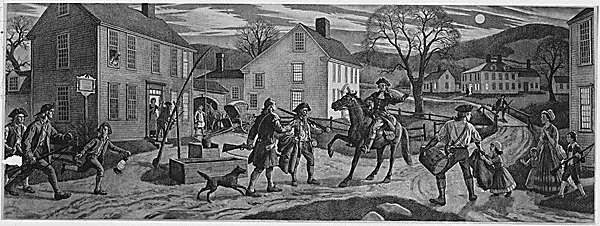
13. What was significant about Lexington and Concord? Lexington was the location of the first battle of the Revolution. The British got word that the colonists were stocking and storing munitions in a shed in Concord. They devised a plan to seize the arms and capture the rebels Sam Adams, Paul Revere and John Hancock. But the colonists intercepted the message and the "minutemen" went into action. They signaled the British route with lanterns from the Old North Church which sparked Paul Revere's famous ride.
"To arms! To arms!" warning the colonists of the approaching Redcoats. Incidently, William Dawes assisted in this courageous endeavor, but got the varitible and historical shaft from Longfellow in the famous poem
Paul Revere's Ride. I'm sure if Dawes' last name had rhymed with "Church" or "horse" or "nasty redcoat", he would certainly have been mentioned.
http://www.legallanguage.com/resources/poems/midnightride/
14. How did Paul Revere get word out that "the British were coming"? Who else rode with him? What was significant about the North Church? (See above!) The Minutemen came through and their lines of communication worked perfectly using the light of the lanterns on the Old North Church, spreading the word quickly through Paul Revere and the Sons of Liberty. Poor little William Dawes rode with him.
15. Who fired "the shot heard 'round the world..."? Some radical gun totin' red-necked, backwoods NRA supportin', bible thumpin' crazy lunatic....or....wait... no one still knows which side it was. He did it! No, he did it! Uh uh... you did it.....!
16. Why was George Washington called "The Indispensible Man"? What a remarkable human being! George Washington was well-respected among all men; whether a diplomat or commoner or one of his troops. But he respected them also. He practiced what he preached, and he preached loyalty to God and country. He defined the difference between his men and authority. If someone left his post, he received one to three hundred lashes. He did not tolerate disobedience. Anyone who went AWOL was hanged for treason. He had an uncanny ability through strategy to win the war though he lost several battles. He had impeccable character and had a commanding air critical to being the commander of the American army at this time.
17. What were the seven obstacles listed, that the British faced even though they were vastly more well-equipped than the colonists? Though they certainly should have won this war, they were 1) fighting in hostile territory, 2) not able to utilize their vast navy, 3) unable to distinguish a strategic port, 4) unable to effectively fight a frontier rebellion, 5) unable to keep the trust and support of the Indians, 6) unable to communicate well between commanders in the field and the crown in England, 7) not supported by the French when the French entered the war. The French were still stinging from the results of the Seven Year's War and wanted revenge.
18. General George Washington, The Indispensible Man, had many
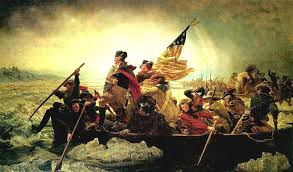
crushing defeats. How can we say that his army's retreat across the Delaware River was a success or victory? Though it was indeed a retreat, it was a remarkable victory and act of faith... or miracle that he was able to get all his men and equipment across the river before the British attacked and literally massacred them all the following day. They were saved by a terrible unrelenting storm during the night and a miraculous soupy fog that hid them the following morning until the last man was across the Delaware and on shore. Washington himself, did not set foot on shore until his last man was safe.
19. According to the signers, what role did God and government play in individual rights? God was all-powerful and allotted those rights. Government was merely a tool in protecting those rights
from foreign and domestic threats.
20. What human frailty caused Benedict Arnold to become the world's definition of "treason"? He was prideful and selfish because he was not given the accolades or recognition that he thought he deserved. He died penniless and only recognized in a most derogatory sense.
21. Treaty of Paris ended the Revelutionary War. What did it stipulate? Land and territory was delegated and lines deliniated to the colonists, France, Spain, etc. Slave rights were also, sadly, included for those who had losses.



